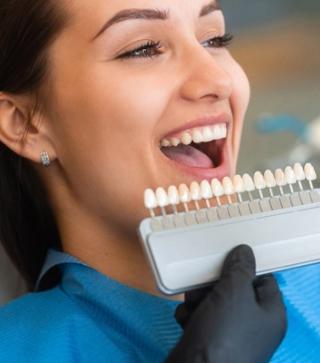Teeth Whitening | At Home (DIY) vs Professional Treatment

A bright, dazzling smile is something many of us desire. It boosts our confidence and enhances our overall appearance. Over time, teeth may become stained or discoloured due to various factors such as age, food and drinks, smoking, and poor oral hygiene. Thankfully, advancements in dental technology have made teeth whitening a popular and accessible solution for achieving a radiant smile. But when it comes to teeth whitening, is it better to visit a dentist or opt for at-home methods? Let's explore the options and find out.
Can Yellow Teeth Be Whitened?
Addressing the fundamental question: Yes, yes they can!
There are several methods available that can effectively whiten yellow or discoloured teeth. These options include professional teeth whitening treatments performed by dentists as well as take-home whitening trays provided by your dentist.
The number of sessions or the intensity of the treatments required to achieve the desired results will depend on the extent and underlying causes of your teeth discoloration.
What Causes Teeth Discolouration?
There are a few things which can cause teeth discolouration, including:
- Coffee
- Smoking
- Red wine
- Food
- Poor oral hygiene
- Worn enamel due to the natural ageing process
- Genetics
Particles left behind on the teeth after eating/drinking or smoking build up over time. Daily brushing and flossing can help to clear plaque and stains, but some level of discolouration is normal amongst people of all ages.
What is the Best Treatment to Whiten Teeth?
When it comes to determining the best treatment to whiten teeth, it largely depends on your specific needs and preferences. Both in-chair and take-home teeth whitening methods have their advantages and considerations to keep in mind.
In-Chair Teeth Whitening:
In-chair teeth whitening, also known as professional or in-office teeth whitening, is performed at a dental clinic by trained professionals. It offers several advantages, including immediate results and the expertise of dental professionals who can monitor the procedure closely.
During an in-chair teeth whitening session, a powerful bleaching gel is applied to your teeth, and a special light or laser may be used to enhance the whitening effect. The entire process typically takes about one to two hours, and multiple sessions may be required for optimal results.
Take-Home Teeth Whitening Kits:
Take-home teeth whitening kits provide a more convenient and cost-effective alternative to in-chair treatments. These kits consist of custom-fitted trays and a professional-grade bleaching gel, which is applied at home according to the dentist's instructions.
While take-home kits may take longer to achieve noticeable results compared to in-chair treatments, they offer the flexibility of whitening your teeth at your own pace and in the comfort of your home. This method is especially suitable for individuals with sensitive teeth who may prefer a more gradual whitening process.
How Much is Teeth Whitening in Australia?
Teeth whitening costs can vary depending on the method chosen.
In-chair teeth whitening treatments performed by dental professionals typically range from $600 to $1,000, depending on the complexity and the desired level of whitening.
On the other hand, take-home teeth whitening kits are usually more affordable, averaging around $300 to $400. Keep in mind that these are general estimates, and the cost may vary based on individual dental practices and geographical locations.
How can I Whiten my Teeth at Home?
If you’d prefer to whiten your teeth in the comfort of your own home, you could benefit from a take-home whitening kit that includes custom dental trays and whitening gel. Your dentist will provide instructions for applying your whitening gel to achieve the desired results.
Although at-home teeth whitening kits can take longer to obtain results compared to the immediate whitening effects of in-practice teeth whitening, the at-home method is very convenient and simply involves wearing your whitening trays for a few hours during the day or overnight.
Can I Whiten My Teeth Using DIY Methods?
The internet is filled with DIY teeth whitening methods and home remedies claiming to provide quick and inexpensive solutions. However, it's important to exercise caution when considering these alternatives.
DIY methods such as lemon juice, baking soda, or charcoal may seem appealing due to their accessibility and affordability, but they can pose risks to your oral health. Lemon juice, for example, is highly acidic and can erode tooth enamel, leading to tooth sensitivity and increased vulnerability to cavities. Baking soda and charcoal, when used excessively or improperly, can also damage the enamel and irritate the gums.
Choosing a non-professional teeth whitening treatment can carry a higher risk of adverse effects, including damage to your teeth and gums, and even a worsening of your discoloration. By far, the safest and most effective option is to have your teeth professionally whitened by your dentist.
What Are the Risks of Teeth Whitening at Home?
While take-home teeth whitening kits provided by dental professionals are generally safe and effective, there are still potential risks associated with at-home whitening.
Improper use of the whitening gel or ill-fitting trays can cause gum irritation, tooth sensitivity, and uneven whitening. Additionally, overuse or excessive application of the bleaching agent can weaken the enamel and harm the underlying dentin, resulting in irreversible damage to the teeth.
To minimise these risks, it's crucial to follow the instructions provided by your dentist carefully and seek their guidance if you experience any discomfort or adverse effects during the whitening process.
Is Teeth Whitening Covered by Medicare in Australia?
As teeth whitening is considered a cosmetic rather than a medical procedure, it’s not covered by Medicare. However, teeth whitening may be covered by certain private health insurance policies, so be sure to check with your provider for any potential coverage.
How Long Does Professional Teeth Whitening Last?
The duration of teeth whitening results varies depending on individual factors such as oral hygiene practices, diet, and lifestyle habits. In general, professional teeth whitening can last anywhere from several months to a year or longer.
To maintain the results for a longer period, it's important to practise good oral hygiene, limit the consumption of staining substances like coffee or red wine, and consider touch-up treatments as recommended by your dentist.
For more information about teeth whitening options and to explore what NDC has to offer, visit our teeth whitening page.
*The before and after photo used in this article is for illustrative purposes only!

